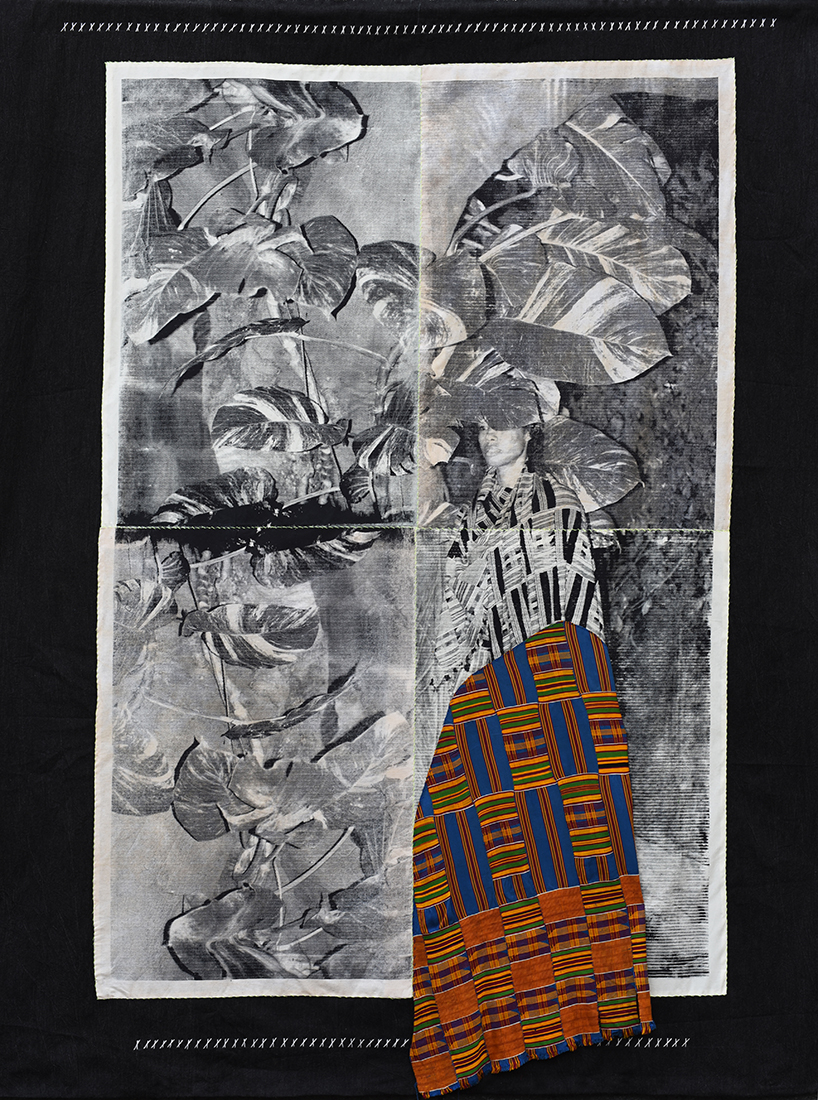TITLE: Unraveled Threads
My aesthetic practice enroots into installation, sculpture, video and photography. I conceptualize West African traditions, spirituality, the thread of my family lineage as they relate to self authorship and the politics of my hybrid identity.
My background lays in fashion and photography. Fashion has such a transformative power, it is one of the most accessible forms of self-identification. In my work where I explore the ability to express our identity, textiles feel like the perfect vehicle with which identity can be performed. In the same time I started to settle within my photographic medium and understand my subconscious is longing to recreate prints I once learned in an analog way. I spent a lot of time in the darkroom and admire those developed images most, especially because I only have black/white photographs from my childhood.
I want to bring this aesthetic into my large-scale images in different print making processes and developed my working methods in screen-printing, cyanotype and van-dyke brown printing onto textiles that connect my interest fields perfectly.
The material literally absorbs the photographic image, demonstrating how in society material can become imbued with meaning, memories, and histories over time. Unraveled Threads, her series that investigates the complexities of self-identity, dutifully (and quite literally) gathers the multiple strands prevalent within the Diaspora and fastens them — aimed at forging connection. Opoku re-creates prized family photographs of her mother and her father, regal, pictured as an Asante King paired with fragments of Kente Cloth and recent staged photographs with her siblings. These materials and gestures hark back to notions of tradition and affinity to a past, a linage that often feels just out of reach. Here, amongst the large-scale, screen-printed fabric canvases, that commemorate as much as they question, Opoku’s journey becomes entangled with
our own.
(Words Sheridan Tucker)
AUTHOR: Zohra Opoku (Ghana)
Zohra Opoku (b. 1976, German/Ghanaian) based in Accra examines political, historical, cultural, and socio-economic influences in the formation of personal identities, particularly in the context of contemporary Ghana. Her practice centers around textiles and traditional Ghanaian dress codes, which have been an inherent part of the country’s identity and industry throughout West Africa’s complex history and serve as vehicles for her to connect to the abstraction of identity in a tangible way.
Opoku's research and explorations have been mostly carried out through the lens of her camera; her photography is expressed via screen-printing and alternative photo processing on varieties of natural fabrics manufactured abroad and distributed in Africa to be re-used as Western Second Hand trade products found on the local market. Additionally, she experiments with new and found wood as well as textiles and garments used in different manifestations of site-specific installations.
While her work relays social commentary and broad themes relating to the human experience, each of Opoku’s explorations is intimately rooted in personal identity politics. She repeatedly integrates family heirlooms and her own self-image into her visual observations of Ghana’s cultural memory.
Exhibited internationally, Zohra Opoku has shown work in association with Mariane Ibrahim Gallery, Seattle (now Chicago); Broad Art Museum, (Michigan State University); Museum of Contemporary Photography, Chicago; Sean Kelly, New York; Gallery 1957, Accra; Nubuke Foundation, Accra; Centre for Contemporary Art, Lagos; !Kauru African Contemporary Art, Johannesburg; Commune.1, Cape Town; Kunsthaus Hamburg; Iwalewahaus, Bayreuth; Musée d’ Ethnographie, Bordeaux; Guggenheim Museum, Bilbao; Kunsthal, Rotterdam, and the Insititute of the Arab World, Paris.
Her recent residencies took place at Jan van Eyck Institute Maastricht; Kala Institute Berkeley; Institute Sacatar Salvador da Bahia and Art Dubai Residents.
SHARE
Support this photographer - share this work on Facebook.

